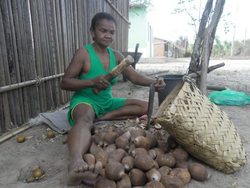
During the World Bank's annual land conference. Actionaid joined with 70 organizations in Brazil and across the globe to reveal how one of the Bank's own projects is a “license for land grabbing.”
Documents forged with cricket poop used to legalize land claims in Brazil as World Bank project opens doors to land grabber
Earlier this month, the World Bank held its annual land and poverty conference. Ironically, the title chosen for the event was ‘Land Governance in an Interconnected World’, but while the bank’s bigwigs championed their role in this space, we joined with 70 organizations in Brazil and across the globe to reveal how the one of its own projects is a “license for land grabbing.”
Located in northeastern Brazil, Piauí is part of a bigger region where large investors that include U.S. and European pension giants such as TIAA, and university endowments such as Harvard, are acquiring large tracts of land for soybean production. In doing so, they’re clearing land in a key part of the Brazilian Cerrado, a major ecological habitat that’s second only to the Amazon in diversity of plants and animals.
Communities of farmers and fishers live in the river valleys of the region. Some live in Afro-Brazilian communities founded by people who escaped slavery centuries ago. Others are indigenous peoples or communities of mixed ancestry. All have long histories of sustainable livelihoods in the region, using the forest and savanna to collect forest products, and graze small herds of livestock.
But Brazil is facing a big problem. In recent years, land speculators and soybean companies, have been grabbing the land on the high plateaus from the communities, using illegal appropriations and fraudulent documents. In some case, these documents are made to look old by storing them in a drawer full of crickets. That’s right, they try to make the title documents appear older using cricket poop!
The multi-million dollar World Bank land regularization program is in the process of formalizing and computerizing land records in the region, but the project lacks safeguards to prevent the legalization of these grabs and the loss of community managed common lands.
To add insult to injury, some companies are also claiming community woodlands in the valleys as their forest reserves so they can clear the entire plateaus for the soybean cultivation. The pesticides and herbicides used on the soybeans wash down into the rivers poisoning food crops and community water supplies which are also being depleted by the soybean irrigation.
In December of last year, a Brazilian judge began overturning false land titles in the region and federal prosecutor wrote to state officials and the World Bank calling for suspension of the land regularization project. But the World Bank apparently did not respond to the request and state officials said the project would go on.
The case in northeastern Brazil is hardly the first time a World Bank land titling program has been used to dispossess communities and indigenous people. I was attending the conference with ActionAid’s partner, the Guatemalan Network of Non-Governmental Organizations and Co-operatives.
Maya Q’eqchi researcher Lourdes Gomez and I presented a paper at the conference on the current situation of indigenous communities in Alta Verapaz who are rapidly losing land to palm oil plantations following the implementation of two World Bank Land Administration Projects costing $100 million. Independent researchers showed that over 40% of land intended for indigenous families in the Petén region after the Guatemalan civil war has already been lost to coercive sales occurring under threats of violence and debt.
Is the World Bank listening to us? Maybe.
Lourdes and I met with World Bank officials to discuss the problems and lessons of land conflict in Guatemala. There is a need for donors to fund projects to protect indigenous land rights that have gone unrecognized, and to fix the situation where land rights have already been privatized.
While the World Bank bears a huge responsibility for the situation. It does not bear it alone. The donor governments who backed the Peace Accords after the genocide carried out against Guatemalan Mayas also have a responsibility to see that the promises to indigenous people are fulfilled, and need to pressure the Guatemalan government to meet the demands of civil society.
After distributing hundreds of copies of the statement on the World Bank’s project in Piauí at their conference, the action produced results. We’ve heard from coalition partners in Brazil that the World Bank made contact this week about plans to send a commission to find out what is happening with the project.
With the interests of big investors at play it will be a long battle to protect community land rights. The communities’ rights to food and water and their way of life are on the line. They have the most at stake, but so do the rest of us.
This is not just about caring about others. Community land rights are the best way to protect forests, the climate, and the food security from the speculative drivers of deforestation to produce commodities for biofuels and industrialized corporate agriculture












